
photoprism
AI-Powered Photos App for the Decentralized Web 🌈💎✨
Stars: 39240
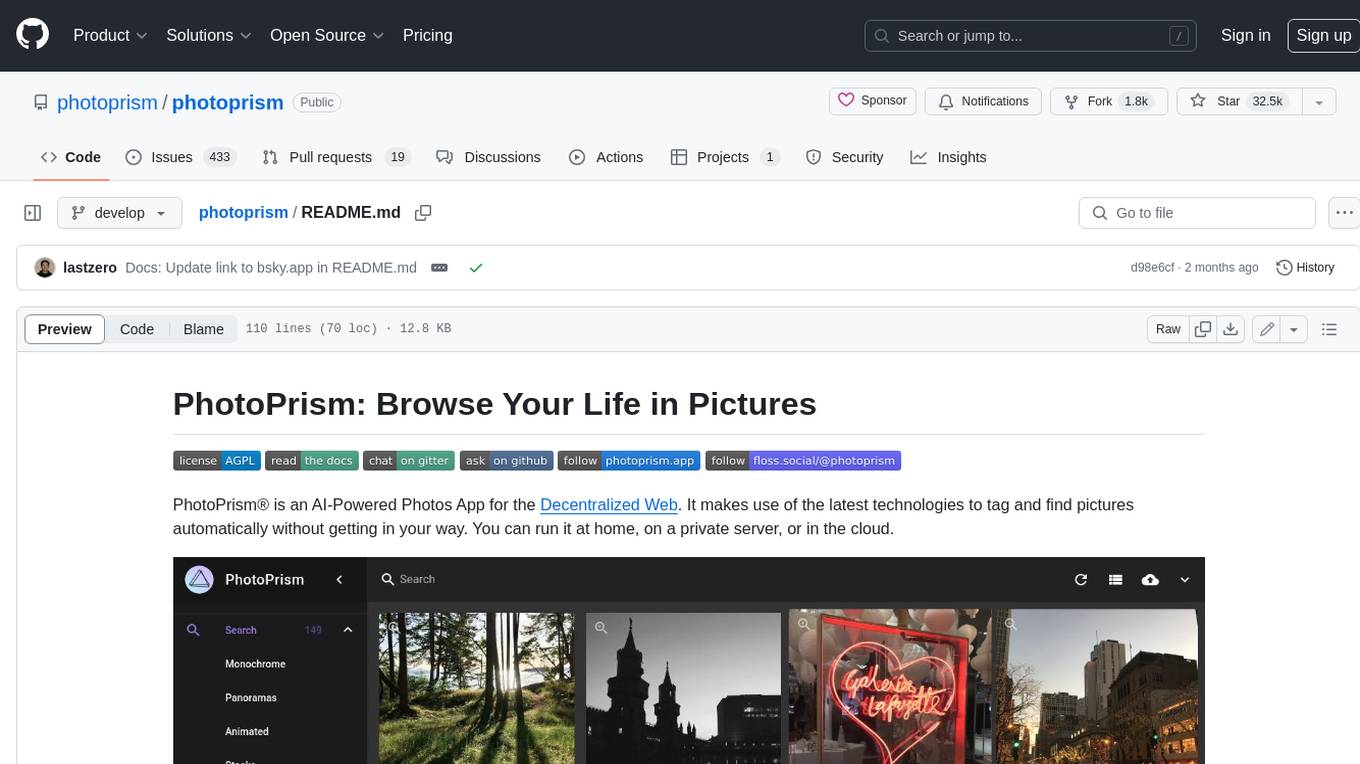
PhotoPrism is an AI-powered photos app for the decentralized web. It uses the latest technologies to tag and find pictures automatically without getting in your way. You can run it at home, on a private server, or in the cloud.
README:
PhotoPrism® is an AI-Powered Photos App for the Decentralized Web. It makes use of the latest technologies to tag and find pictures automatically without getting in your way. You can run it at home, on a private server, or in the cloud.
To get a first impression, you are welcome to play with our public demo. Please be careful not to upload any private, unlawful or offensive pictures.
Our mission is to provide the most user- and privacy-friendly solution to keep your pictures organized and accessible. That's why PhotoPrism was built from the ground up to run wherever you need it, without compromising freedom, privacy, or functionality:
- Browse all your pictures without worrying about RAW images or video formats
- Whether you're using a phone, tablet, or desktop computer, our intuitive PWA provides a native app-like experience and can be easily installed on your home screen
- Quickly find specific photos and videos with powerful search filters that can be combined and are available for many different properties, including labels, location, resolution, color, chroma, and quality
- Automatically labels your pictures based on content and location, and recognizes the faces of your family and friends
- Live Photos start playing when you hover over them and when viewing a slideshow
- Six high-resolution World Maps and our privacy-preserving geocoding service help bring back memories of your favorite trips and let you explore the world
- Metadata can be extracted and merged from Exif, XMP, and other sources like Google Photos
- Use compatible apps like PhotoSync to back up iOS and Android phones in the background
- WebDAV clients such as Microsoft's Windows Explorer and Apple's Finder can connect directly to PhotoPrism, allowing you to open, edit, and delete files from your computer as if they were local
Being completely self-funded and independent, we can promise you that we will never sell your data and that we will always be transparent about our software and services. Your data will never be shared with Google, Amazon, Microsoft or Apple unless you intentionally upload files to one of their services. 🔒
Step-by-step installation instructions for our self-hosted community edition can be found on docs.photoprism.app - all you need is a Web browser and Docker to run the server. It is available for Mac, Linux, and Windows.
The stable releases and development preview are available as a multi-arch image for 64-bit AMD, Intel, and ARM processors. That means, Raspberry Pi and Apple Silicon users enjoy the exact same functionality and can follow the same installation steps.
See our Getting Started FAQ for alternative installation methods, for example using the tar.gz packages we provide.
PhotoPrism is 100% self-funded and independent. Your continued support helps us provide more features to the public, release regular updates, and remain independent!
Our members enjoy additional features, including access to interactive world maps, and can join our private chat room to connect with our team. We currently have the following membership options:
- You can sign up directly on our website and pay with credit card or SEPA through Stripe, so you don't need to link an external account and can easily upgrade or downgrade at any time
- Alternatively, Patreon also supports PayPal, additional currencies, and lets you choose between monthly and annual billing for all tiers
If you currently support us through GitHub Sponsors, you can also register on our website and use the Activate GitHub Sponsors Membership button to link your account. For details on this and how to link your Patreon account, see our Activation Guide.
You are welcome to contact us for change requests, membership questions, and business partnerships.
View Membership FAQ › Sign Up ›
- Your continued support helps us provide regular updates and remain independent, so we can fulfill our mission and protect your privacy
- Sustained funding is key to quickly releasing new features requested by you and other community members
- Being self-funded and independent, we can personally promise you that we will never sell your data and that we will always be transparent about our software and services
Please also leave a star on GitHub if you like this project. It provides additional motivation to keep going.
A big thank you to all current and past sponsors, whose generous support has been and continues to be essential to the success of the project!
View Sponsors › View Credits ›
Visit docs.photoprism.app/user-guide to learn how to sync, organize, and share your pictures. If you need help installing our software at home, you are welcome to post your question in GitHub Discussions or ask in our Community Chat. Common problems can be quickly diagnosed and solved using our Troubleshooting Checklists. Eligible members are also welcome to email us for technical support and advice.
Our Project Roadmap shows what tasks are in progress and what features will be implemented next. You are invited to give ideas you like a thumbs-up, so we know what's most popular.
Be aware that we have a zero-bug policy and do our best to help users when they need support or have other questions. This comes at a price though, as we can't give exact release dates for new features. Our team receives many more requests than can be implemented, so we want to emphasize that we are in no way obligated to implement the features, enhancements, or other changes you request. We do, however, appreciate your feedback and carefully consider all requests.
Because sustained funding is key to quickly releasing new features, we encourage you to support our mission by signing up for a personal membership or purchasing a commercial license.
We kindly ask you not to report bugs via GitHub Issues unless you are certain to have found a fully reproducible and previously unreported issue that must be fixed directly in the app. Thank you for your careful consideration!
- When browsing issues, please note that our team and all issue subscribers receive an email notification from GitHub whenever a new comment is added, so these should only be used for sharing important information and not for discussions, questions, or expressing personal opinions
- In order for us to investigate new bug reports, they must include a complete list of steps to reproduce the problem, the software versions used and information about the environment in which the problem occurred, such as browser type, browser version, browser plug-ins, operating system, storage type, processor type, and memory size
- Contact us or a community member if you need help, it could be a local configuration problem, or a misunderstanding in how the software works
- This gives us the opportunity to improve our documentation and provide best-in-class support instead of dealing with unclear/duplicate bug reports or triggering a flood of notifications by replying to comments
Follow us on Mastodon, Bluesky, or join the Community Chat to get regular updates, connect with other users, and discuss your ideas. Our Code of Conduct explains the "dos and don’ts" when interacting with other community members.
As a contributor, you are also welcome to contact us directly if you have something on your mind that you don't want to discuss publicly. Please note, however, that due to the high volume of emails we receive, our team may be unable to get back to you immediately. We do our best to respond within five business days or less.
We welcome contributions of any kind, including blog posts, tutorials, translations, testing, writing documentation, and pull requests. Our Developer Guide contains all the information necessary for you to get started.
PhotoPrism® is a registered trademark. By using the software and services we provide, you agree to our Terms of Service, Privacy Policy, and Code of Conduct. Docs are available under the CC BY-NC-SA 4.0 License; additional terms may apply.
For Tasks:
Click tags to check more tools for each tasksFor Jobs:
Alternative AI tools for photoprism
Similar Open Source Tools

photoprism
PhotoPrism is an AI-powered photos app for the decentralized web. It uses the latest technologies to tag and find pictures automatically without getting in your way. You can run it at home, on a private server, or in the cloud.
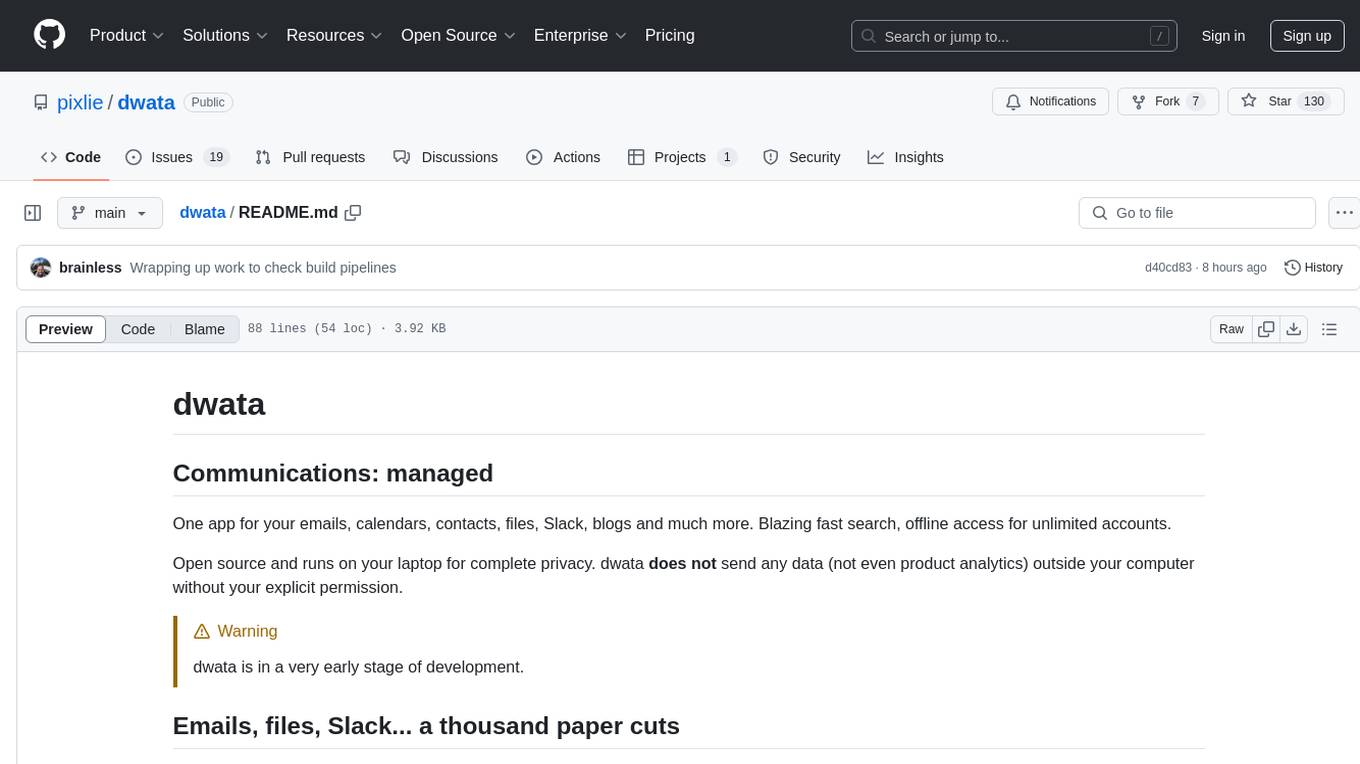
dwata
dwata is an open source desktop app designed to manage all your private data on your laptop, providing offline access, fast search capabilities, and organization features for emails, files, contacts, events, and tasks. It aims to reduce cognitive overhead in daily digital life by offering a centralized platform for personal data management. The tool prioritizes user privacy, with no data being sent outside the user's computer without explicit permission. dwata is still in early development stages and offers integration with AI providers for advanced functionalities.
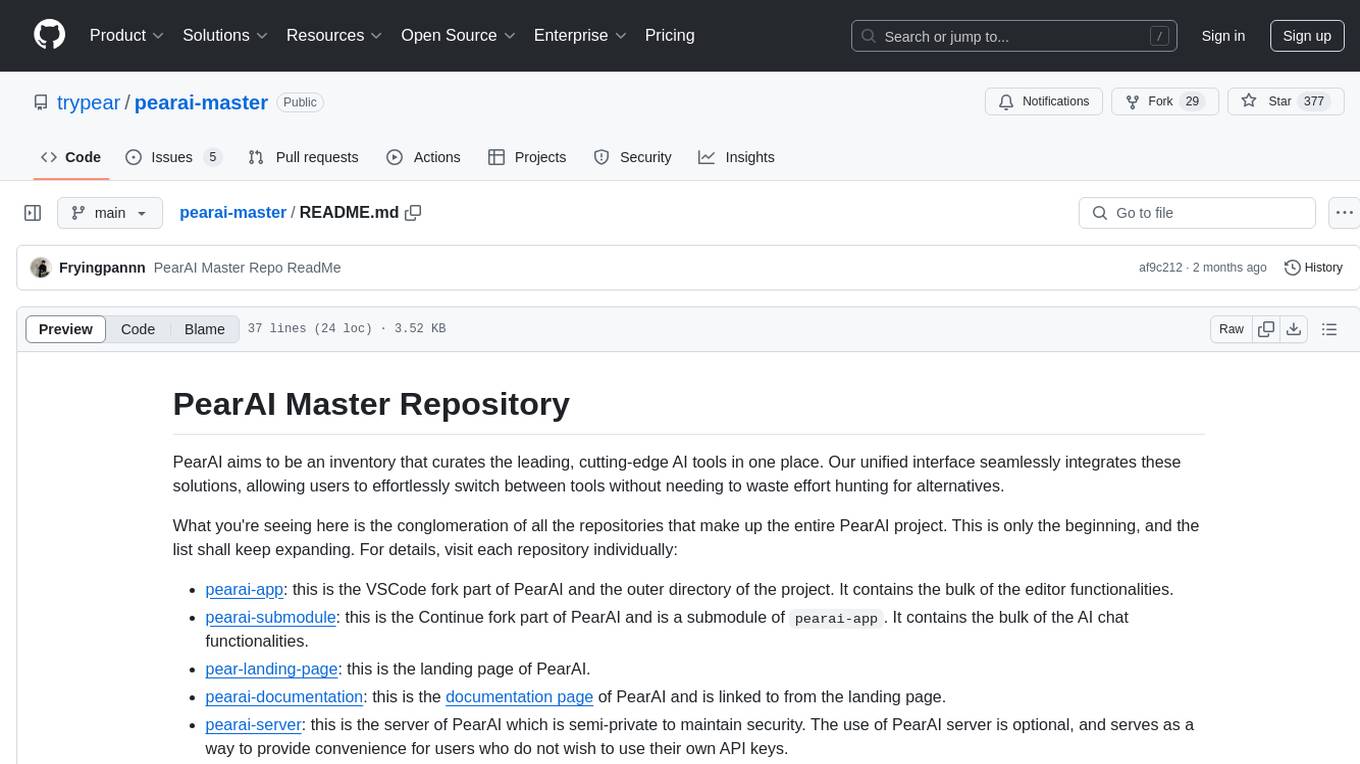
pearai-master
PearAI is an inventory that curates cutting-edge AI tools in one place, offering a unified interface for seamless tool integration. The repository serves as the conglomeration of all PearAI project repositories, including VSCode fork, AI chat functionalities, landing page, documentation, and server. Contributions are welcome through quests and issue tackling, with the project stack including TypeScript/Electron.js, Next.js/React, Python FastAPI, and Axiom for logging/telemetry.
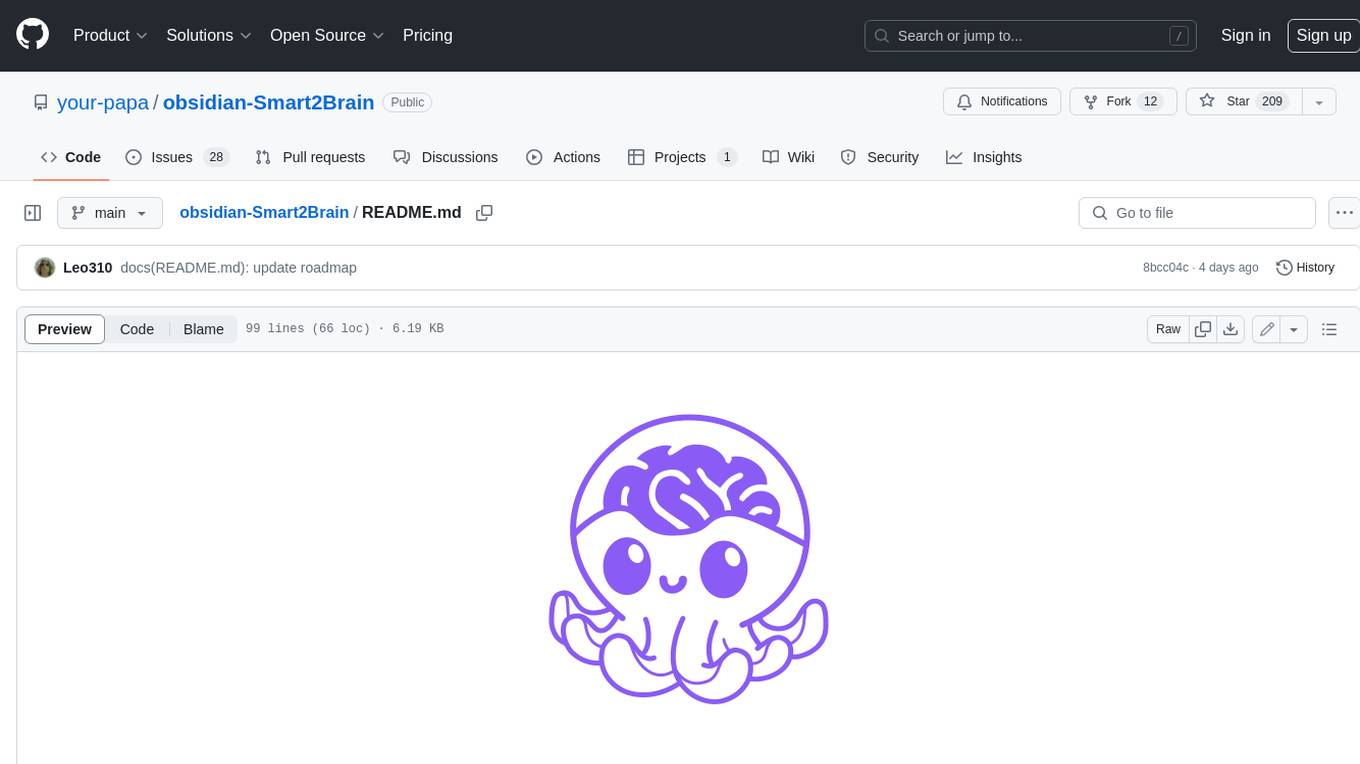
obsidian-Smart2Brain
Your Smart Second Brain is a free and open-source Obsidian plugin that serves as your personal assistant, powered by large language models like ChatGPT or Llama2. It can directly access and process your notes, eliminating the need for manual prompt editing, and it can operate completely offline, ensuring your data remains private and secure.

local-chat
LocalChat is a simple, easy-to-set-up, and open-source local AI chat tool that allows users to interact with generative language models on their own computers without transmitting data to a cloud server. It provides a chat-like interface for users to experience ChatGPT-like behavior locally, ensuring GDPR compliance and data privacy. Users can download LocalChat for macOS, Windows, or Linux to chat with open-weight generative language models.
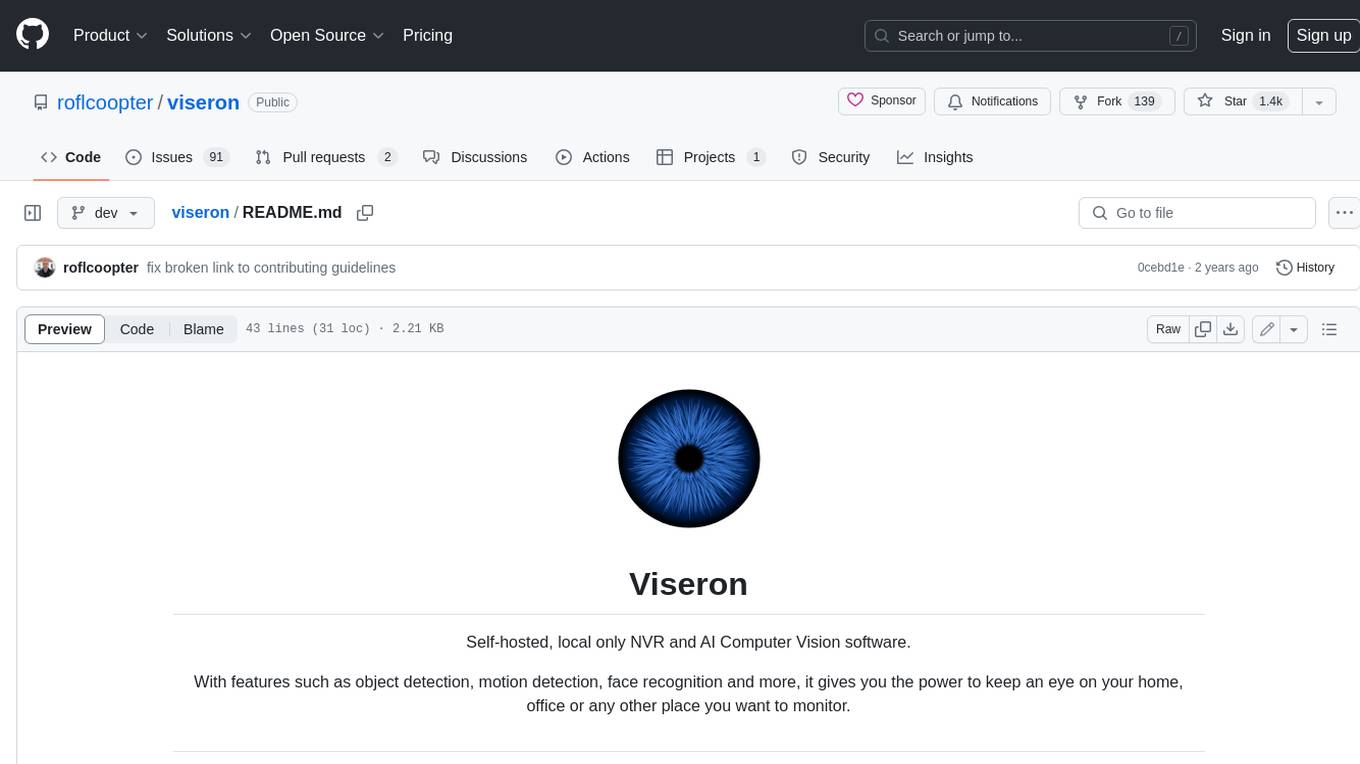
viseron
Viseron is a self-hosted, local-only NVR and AI computer vision software that provides features such as object detection, motion detection, and face recognition. It allows users to monitor their home, office, or any other place they want to keep an eye on. Getting started with Viseron is easy by spinning up a Docker container and editing the configuration file using the built-in web interface. The software's functionality is enabled by components, which can be explored using the Component Explorer. Contributors are welcome to help with implementing open feature requests, improving documentation, and answering questions in issues or discussions. Users can also sponsor Viseron or make a one-time donation.
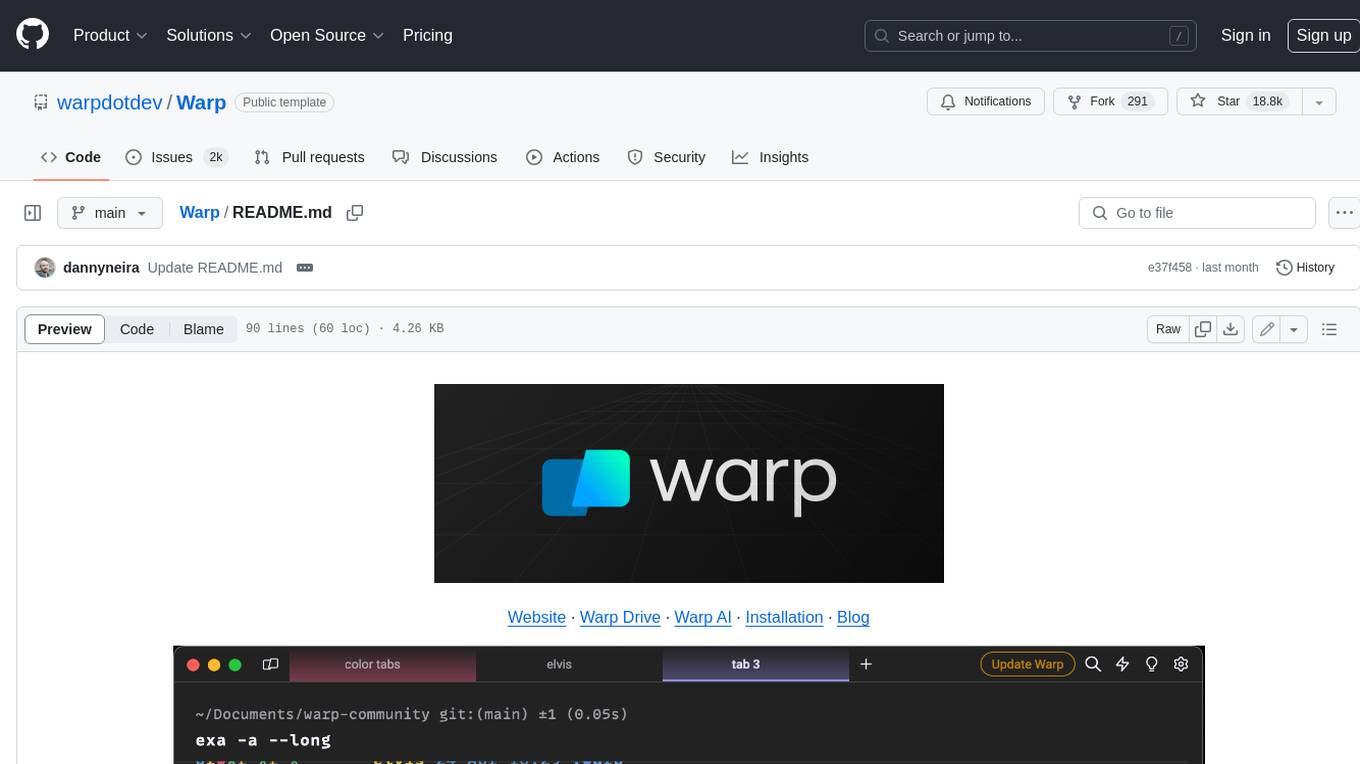
Warp
Warp is a blazingly-fast modern Rust based GPU-accelerated terminal built to make you and your team more productive. It is available for macOS and Linux users, with plans to support Windows and the Web (WASM) in the future. Warp has a community search page where you can find solutions to common issues, and you can file issue requests in the repo if you can't find a solution. Warp is open-source, and the team is planning to first open-source their Rust UI framework, and then parts and potentially all of their client codebase.
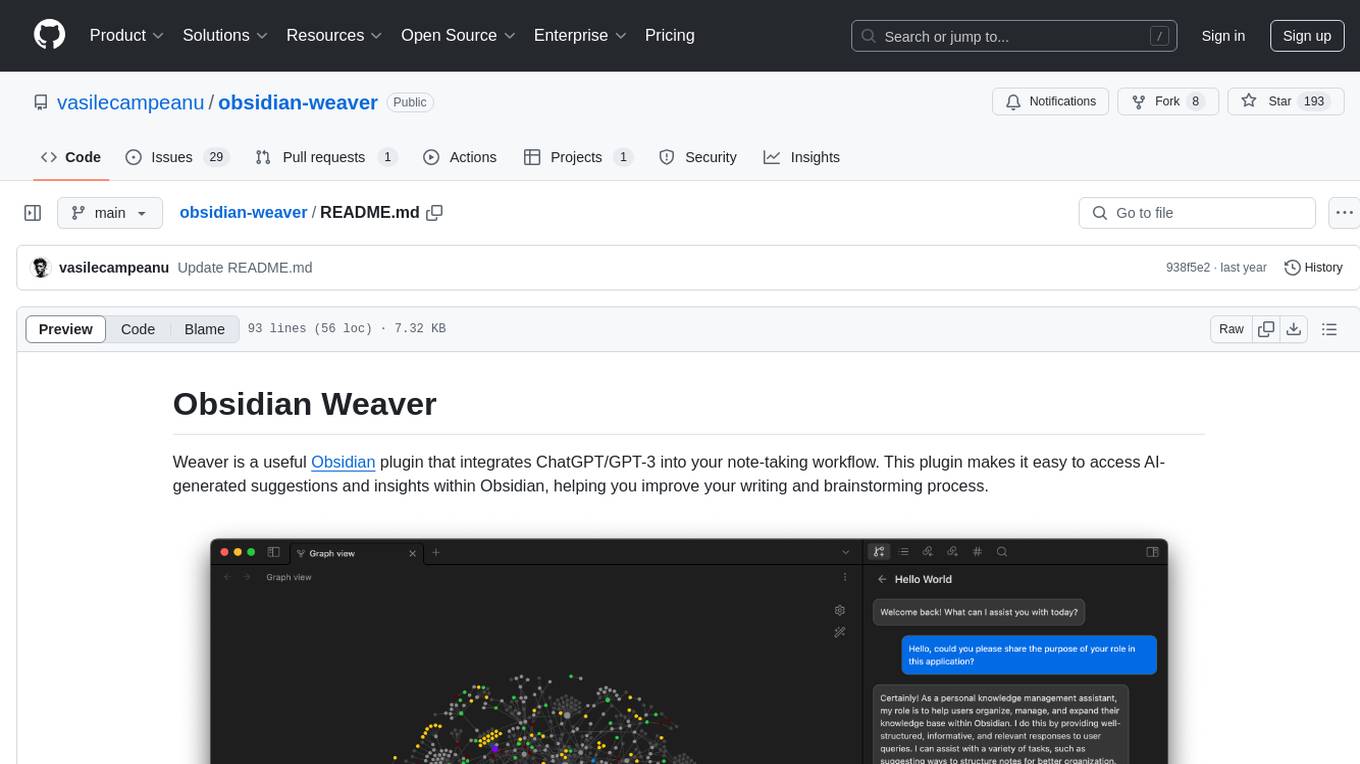
obsidian-weaver
Obsidian Weaver is a plugin that integrates ChatGPT/GPT-3 into the note-taking workflow of Obsidian. It allows users to easily access AI-generated suggestions and insights within Obsidian, enhancing the writing and brainstorming process. The plugin respects Obsidian's philosophy of storing notes locally, ensuring data security and privacy. Weaver offers features like creating new chat sessions with the AI assistant and receiving instant responses, all within the Obsidian environment. It provides a seamless integration with Obsidian's interface, making the writing process efficient and helping users stay focused. The plugin is constantly being improved with new features and updates to enhance the note-taking experience.
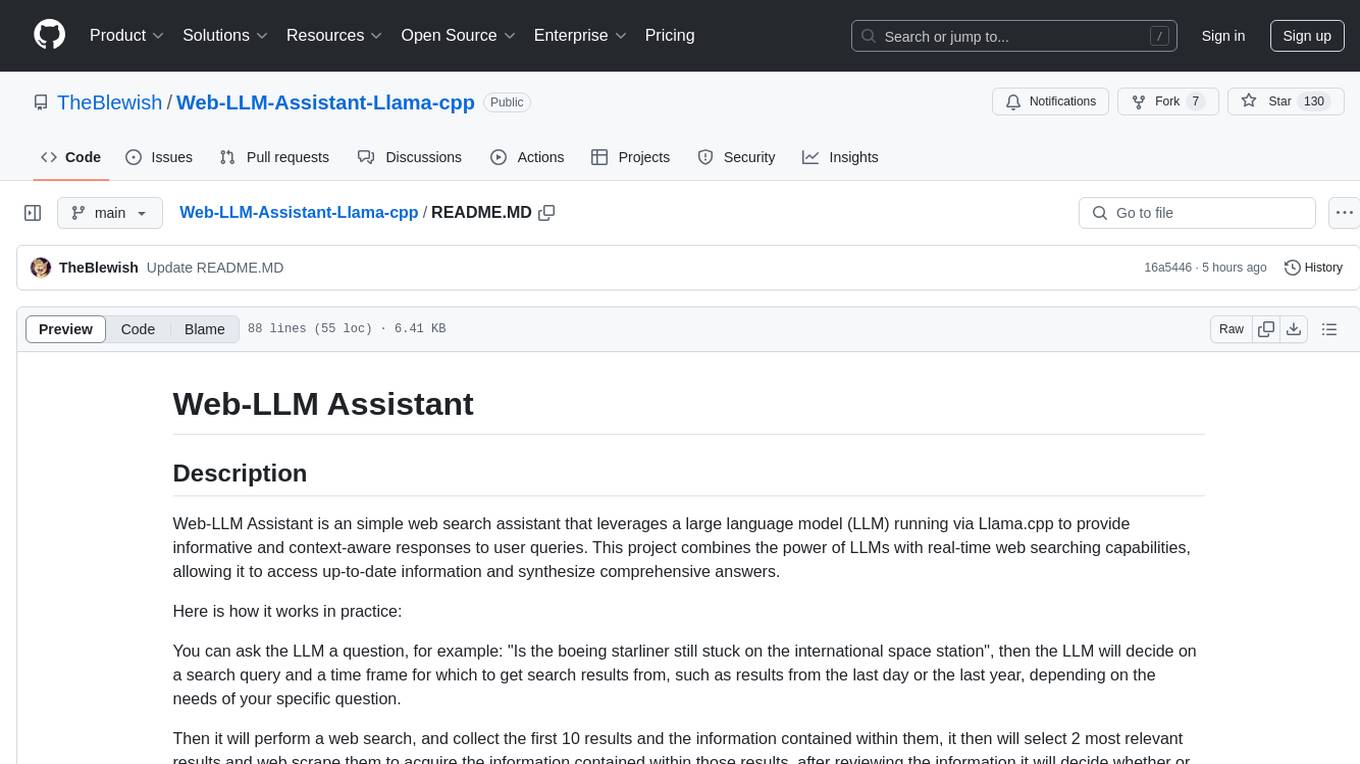
Web-LLM-Assistant-Llama-cpp
Web-LLM Assistant is a simple web search assistant that leverages a large language model (LLM) running via Llama.cpp to provide informative and context-aware responses to user queries. It combines the power of LLMs with real-time web searching capabilities, allowing it to access up-to-date information and synthesize comprehensive answers. The tool performs web searches, collects and scrapes information from search results, refines search queries, and provides answers based on the acquired information. Users can interact with the tool by asking questions or requesting web searches, making it a valuable resource for obtaining information beyond the LLM's training data.
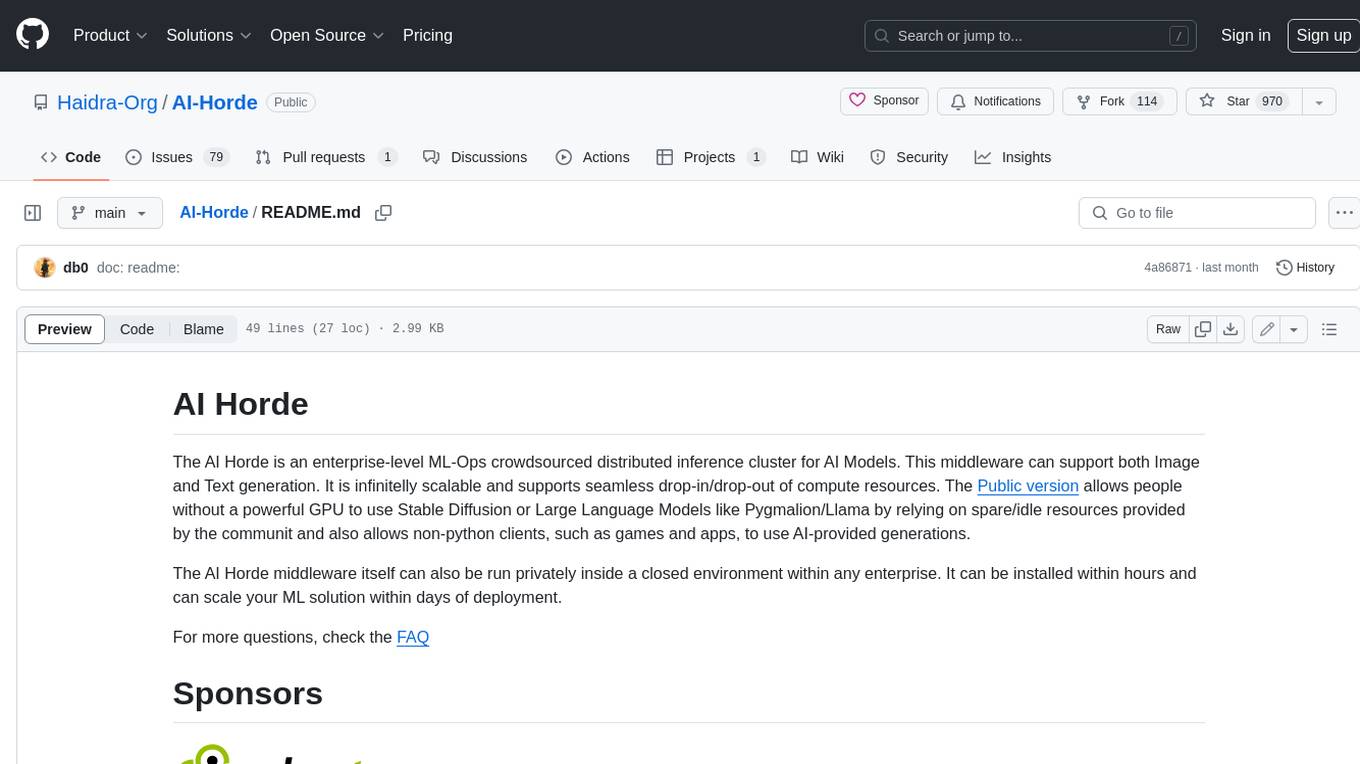
AI-Horde
The AI Horde is an enterprise-level ML-Ops crowdsourced distributed inference cluster for AI Models. This middleware can support both Image and Text generation. It is infinitely scalable and supports seamless drop-in/drop-out of compute resources. The Public version allows people without a powerful GPU to use Stable Diffusion or Large Language Models like Pygmalion/Llama by relying on spare/idle resources provided by the community and also allows non-python clients, such as games and apps, to use AI-provided generations.
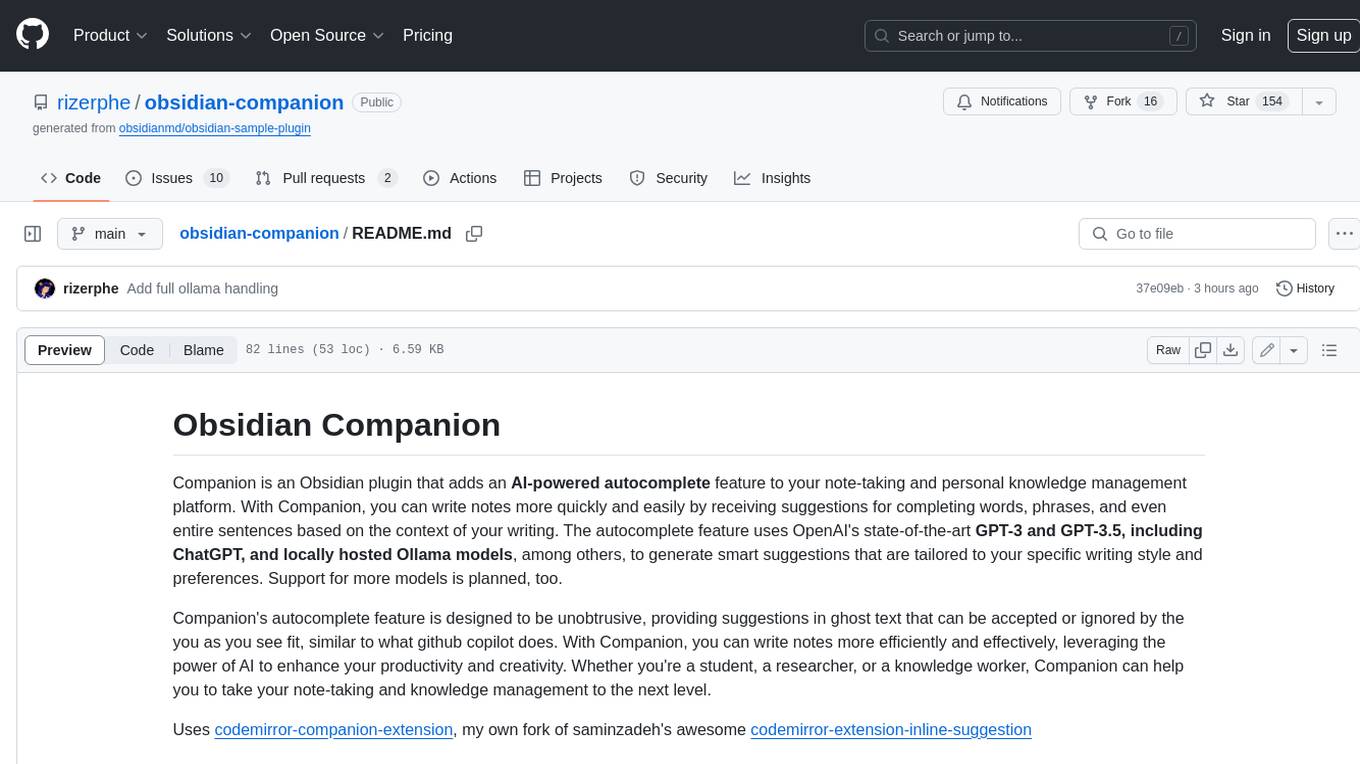
obsidian-companion
Companion is an Obsidian plugin that adds an AI-powered autocomplete feature to your note-taking and personal knowledge management platform. With Companion, you can write notes more quickly and easily by receiving suggestions for completing words, phrases, and even entire sentences based on the context of your writing. The autocomplete feature uses OpenAI's state-of-the-art GPT-3 and GPT-3.5, including ChatGPT, and locally hosted Ollama models, among others, to generate smart suggestions that are tailored to your specific writing style and preferences. Support for more models is planned, too.
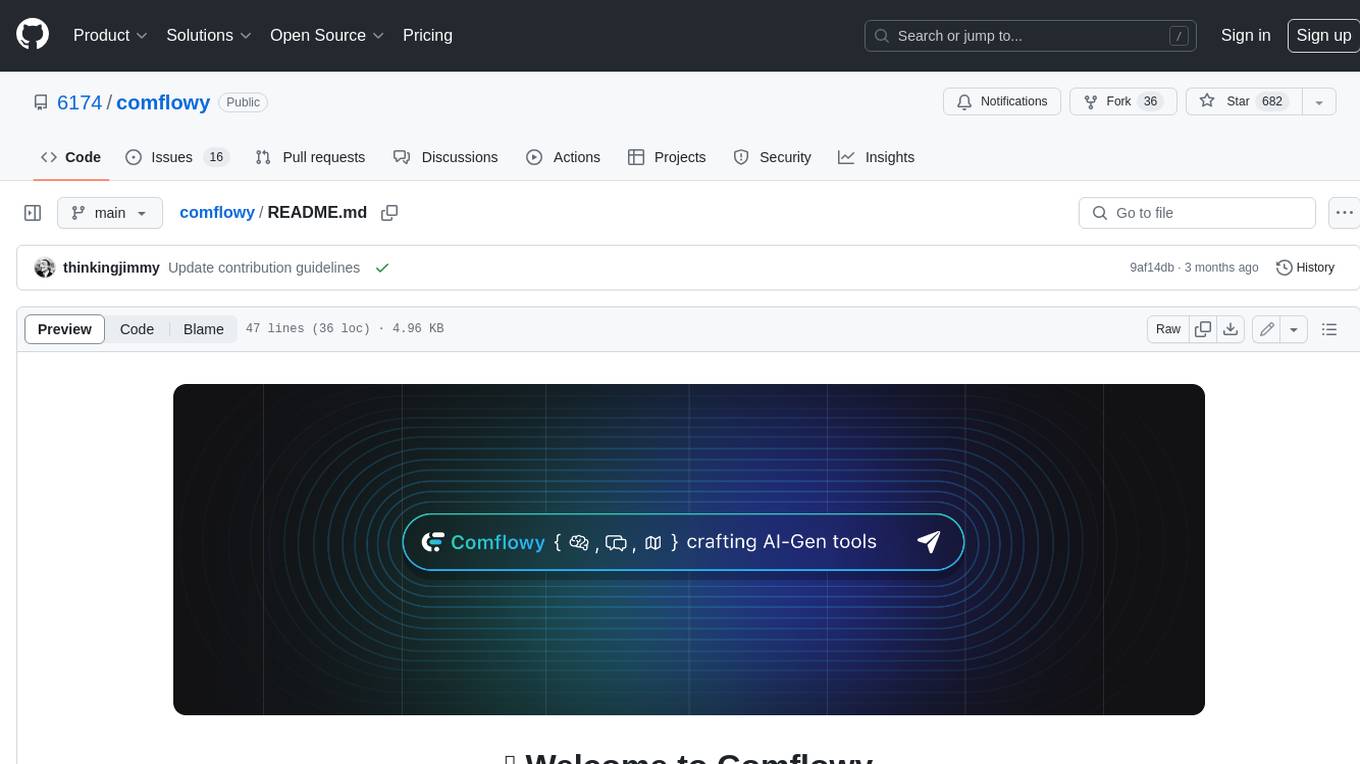
comflowy
Comflowy is a community dedicated to providing comprehensive tutorials, fostering discussions, and building a database of workflows and models for ComfyUI and Stable Diffusion. Our mission is to lower the entry barrier for ComfyUI users, promote its mainstream adoption, and contribute to the growth of the AI generative graphics community.
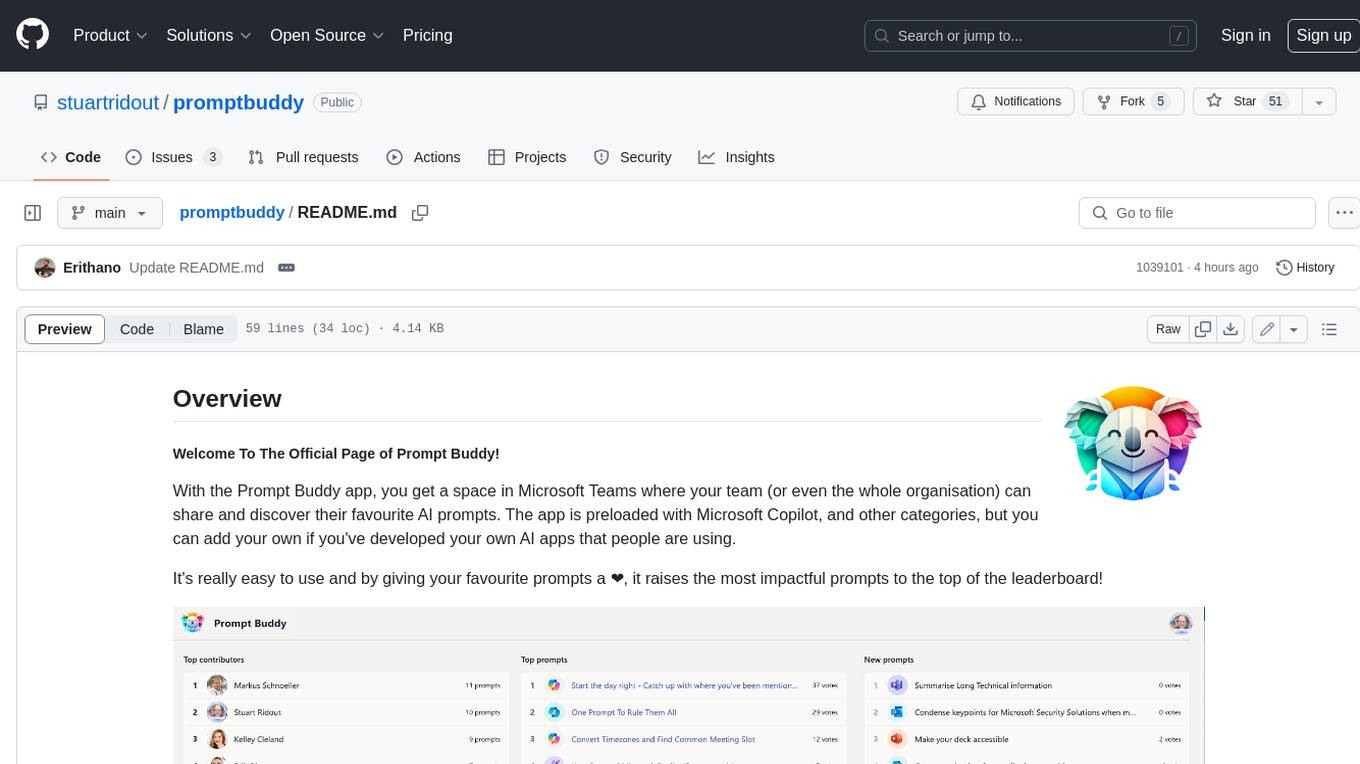
promptbuddy
Prompt Buddy is a Microsoft Teams app that provides a central location for teams to share and discover their favorite AI prompts. It comes preloaded with Microsoft Copilot and other categories, but users can also add their own custom prompts. The app is easy to use and allows users to upvote their favorite prompts, which raises them to the top of the leaderboard. Prompt Buddy also supports dark mode and offers a mobile layout for use on phones. It is built on the Power Platform and can be customized and extended by the installer.
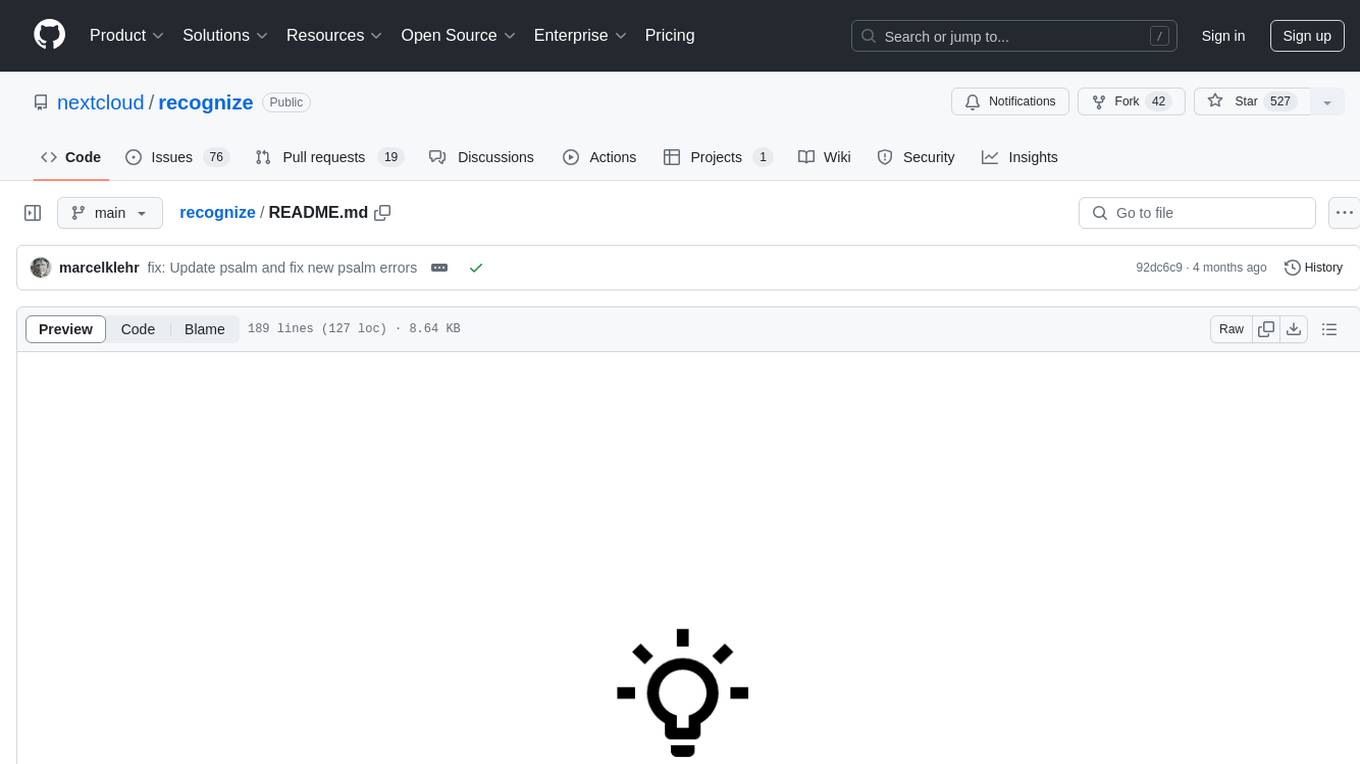
recognize
Recognize is a smart media tagging tool for Nextcloud that automatically categorizes photos and music by recognizing faces, animals, landscapes, food, vehicles, buildings, landmarks, monuments, music genres, and human actions in videos. It uses pre-trained models for object detection, landmark recognition, face comparison, music genre classification, and video classification. The tool ensures privacy by processing images locally without sending data to cloud providers. However, it cannot process end-to-end encrypted files. Recognize is rated positively for ethical AI practices in terms of open-source software, freely available models, and training data transparency, except for music genre recognition due to limited access to training data.
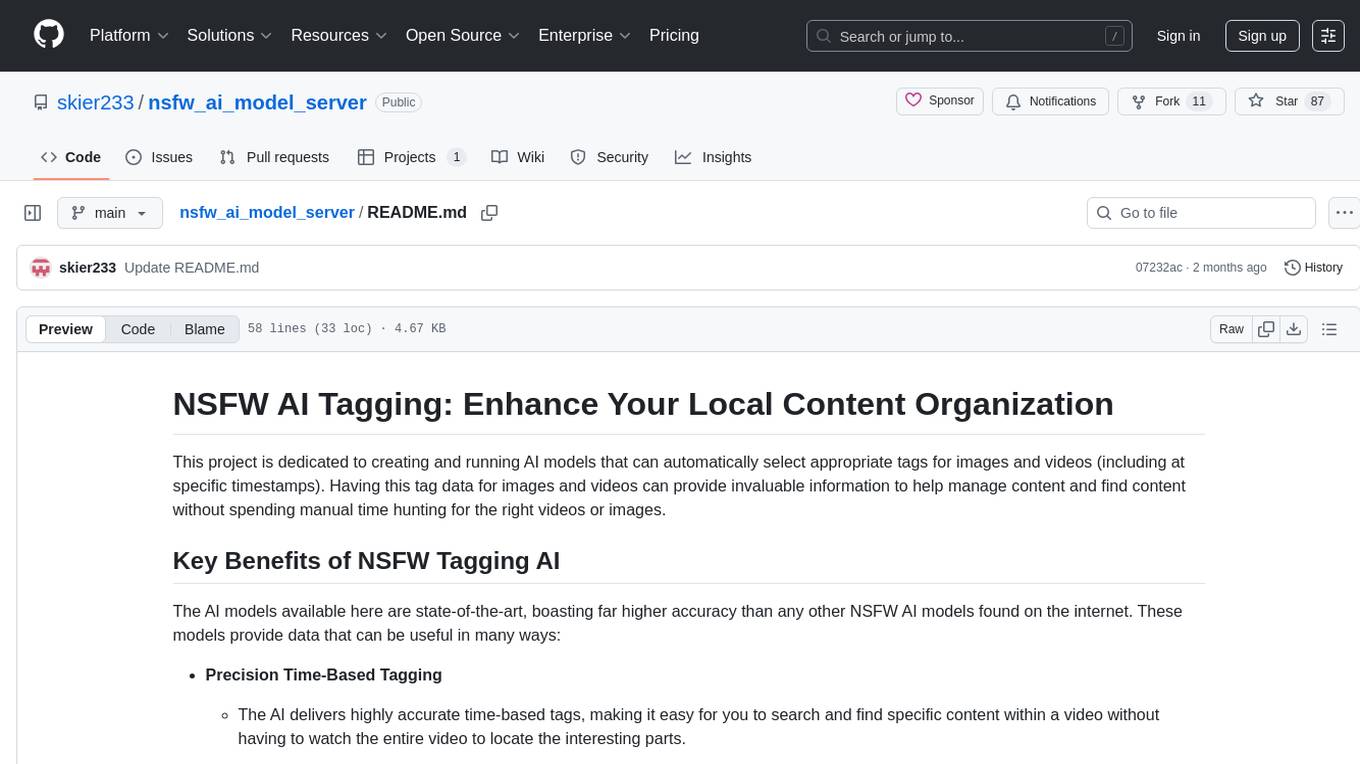
nsfw_ai_model_server
This project is dedicated to creating and running AI models that can automatically select appropriate tags for images and videos, providing invaluable information to help manage content and find content without manual effort. The AI models deliver highly accurate time-based tags, enhance searchability, improve content management, and offer future content recommendations. The project offers a free open source AI model supporting 10 tags and several paid Patreon models with 151 tags and additional variations for different tradeoffs between accuracy and speed. The project has limitations related to usage restrictions, hardware requirements, performance on CPU, complexity, and model access.
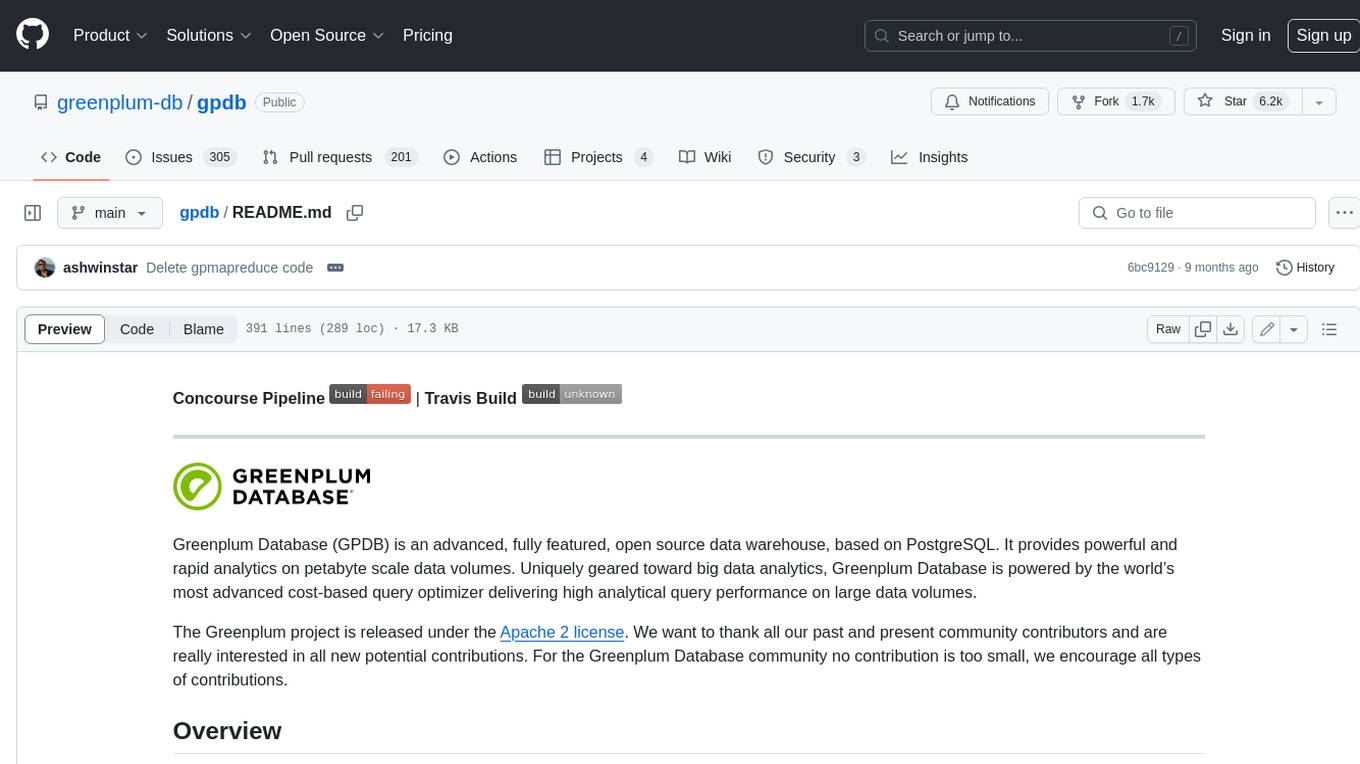
gpdb
Greenplum Database (GPDB) is an advanced, fully featured, open source data warehouse, based on PostgreSQL. It provides powerful and rapid analytics on petabyte scale data volumes. Uniquely geared toward big data analytics, Greenplum Database is powered by the world’s most advanced cost-based query optimizer delivering high analytical query performance on large data volumes.
For similar tasks

photoprism
PhotoPrism is an AI-powered photos app for the decentralized web. It uses the latest technologies to tag and find pictures automatically without getting in your way. You can run it at home, on a private server, or in the cloud.
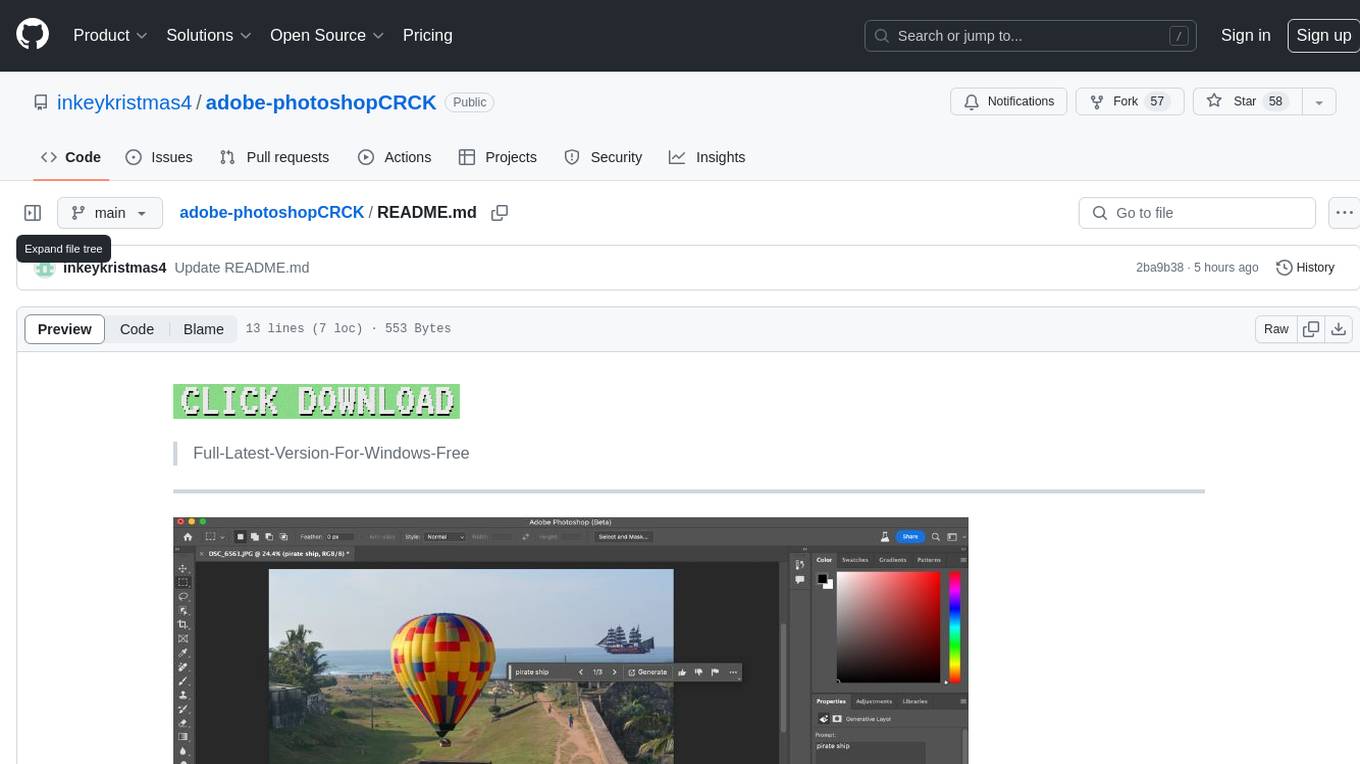
adobe-photoshopCRCK
Adobe PhotoshopCRCK is a tool designed to provide users with the latest version of Adobe Photoshop for free on Windows. It allows users to access advanced photo editing features and functionalities without the need for a paid subscription. The tool is intended for individuals looking to explore professional photo editing capabilities without incurring additional costs. With Adobe PhotoshopCRCK, users can enhance their images, create stunning graphics, and unleash their creativity through a wide range of editing tools and options.
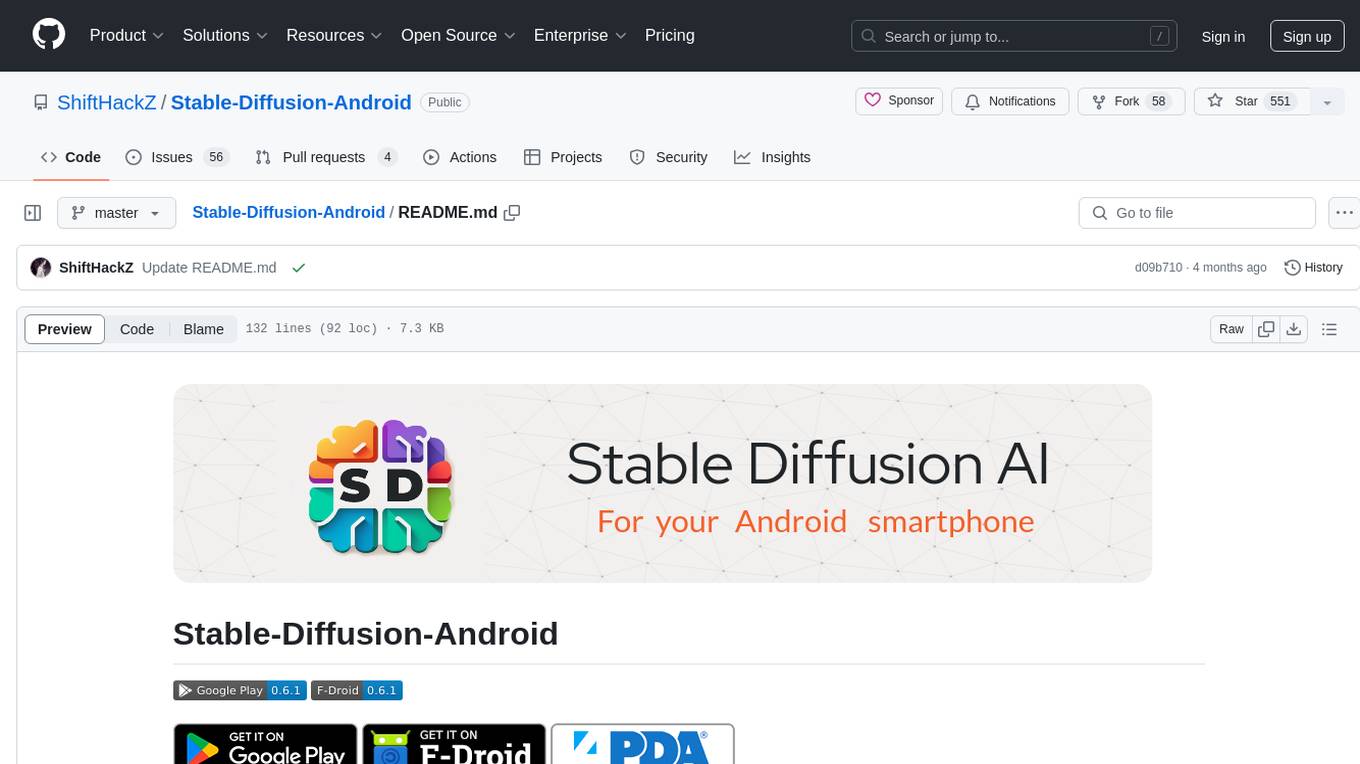
Stable-Diffusion-Android
Stable Diffusion AI is an easy-to-use app for generating images from text or other images. It allows communication with servers powered by various AI technologies like AI Horde, Hugging Face Inference API, OpenAI, StabilityAI, and LocalDiffusion. The app supports Txt2Img and Img2Img modes, positive and negative prompts, dynamic size and sampling methods, unique seed input, and batch image generation. Users can also inpaint images, select faces from gallery or camera, and export images. The app offers settings for server URL, SD Model selection, auto-saving images, and clearing cache.
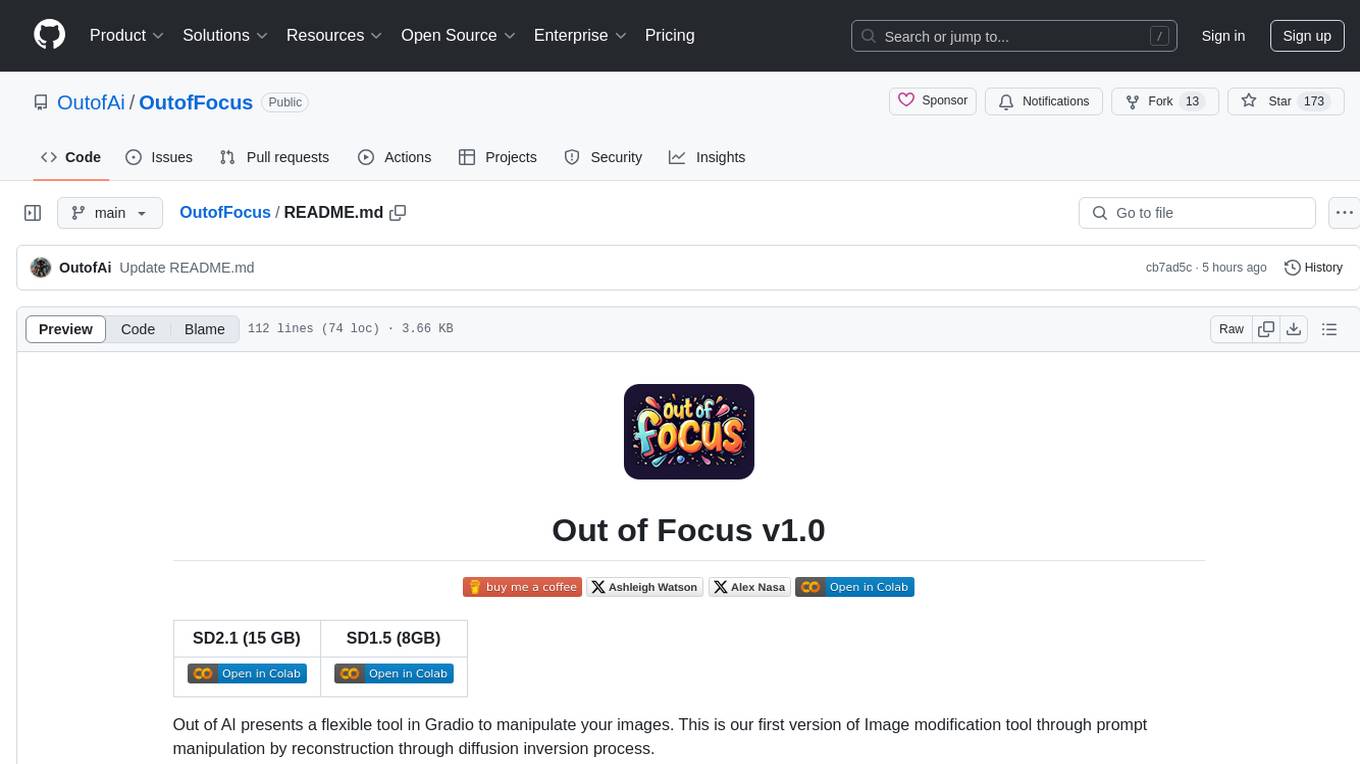
OutofFocus
Out of Focus v1.0 is a flexible tool in Gradio for image manipulation through prompt manipulation by reconstruction via diffusion inversion process. Users can modify images using this tool, which is the first version of the Image modification tool by Out of AI.
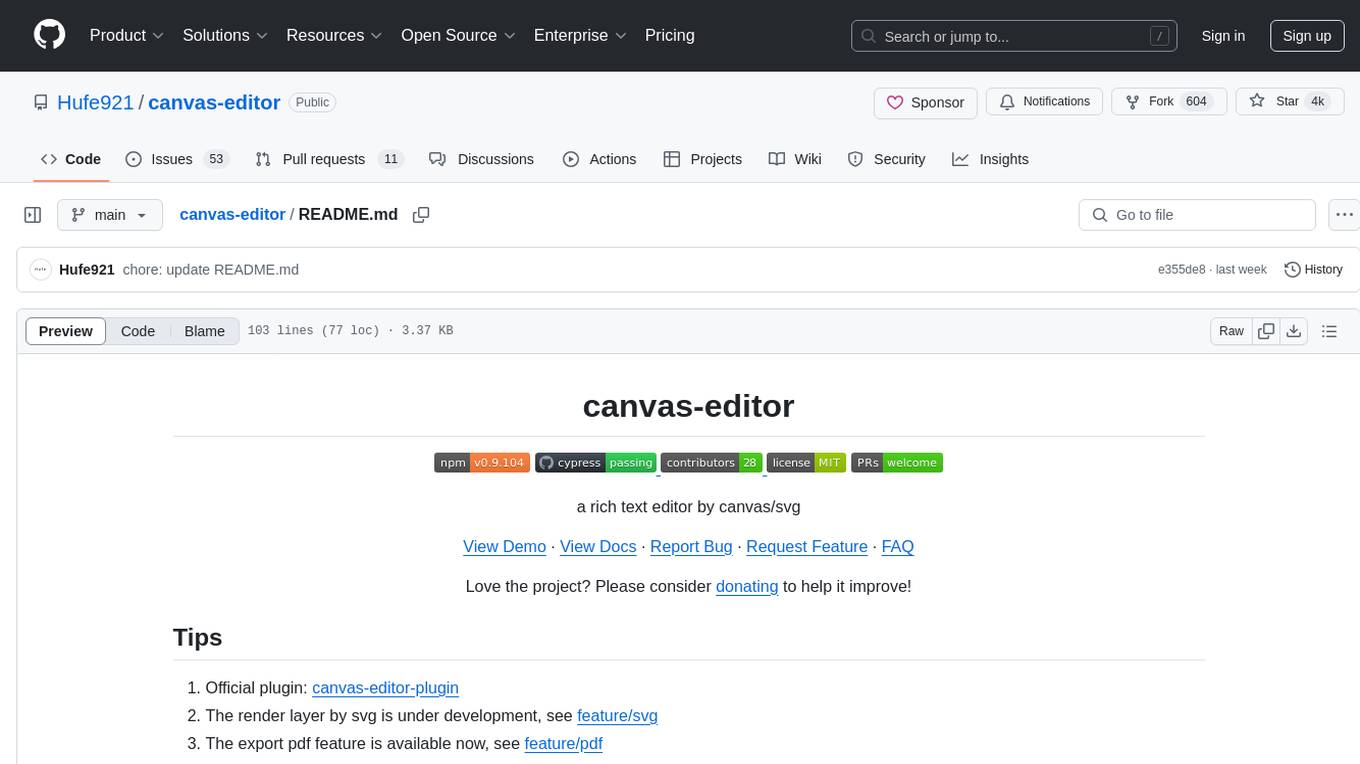
canvas-editor
Canvas Editor is a web-based tool that allows users to create and edit images and graphics directly in the browser. It provides a user-friendly interface with features such as drawing tools, shapes, text editing, and image manipulation. Users can easily customize their designs and export them in various formats. The tool is suitable for graphic designers, web developers, artists, educators, and hobbyists who need a simple yet powerful tool for creating visual content.
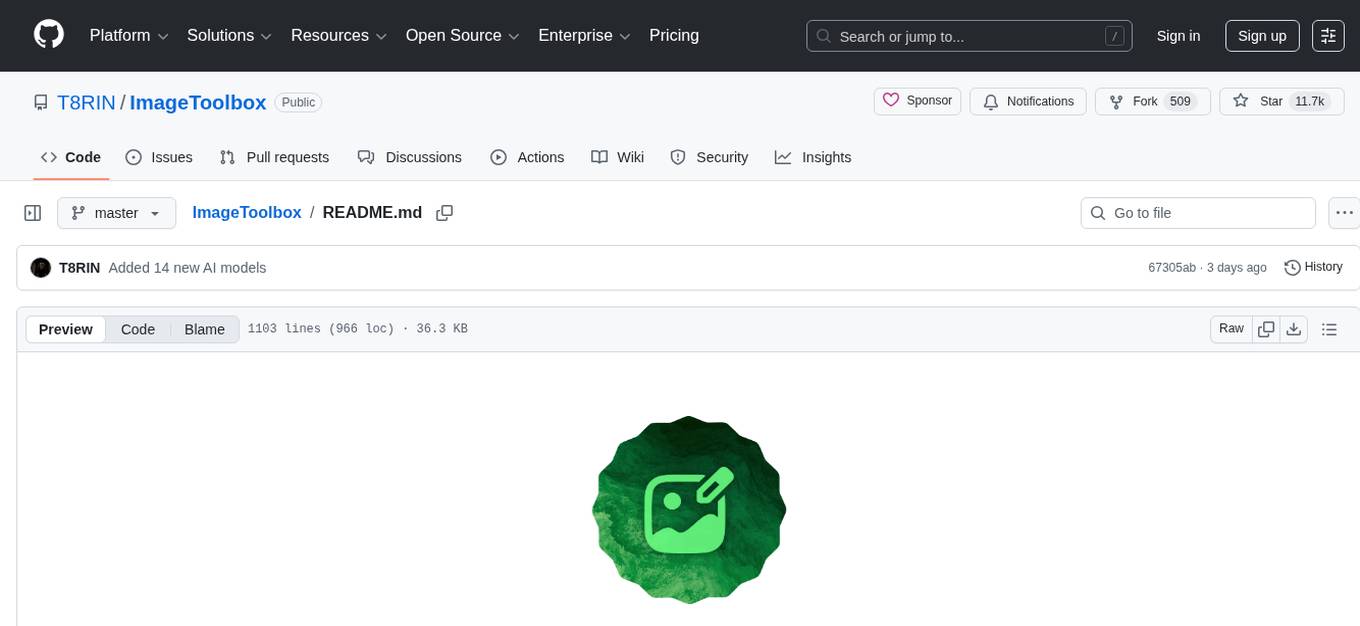
ImageToolbox
ImageToolbox is a versatile image editing tool designed for efficient photo manipulation. It allows users to crop, apply filters, edit EXIF data, erase backgrounds, and even enhance images with AI. Ideal for both photographers and developers, the tool offers a simple interface with powerful capabilities.

exif-photo-blog
EXIF Photo Blog is a full-stack photo blog application built with Next.js, Vercel, and Postgres. It features built-in authentication, photo upload with EXIF extraction, photo organization by tag, infinite scroll, light/dark mode, automatic OG image generation, a CMD-K menu with photo search, experimental support for AI-generated descriptions, and support for Fujifilm simulations. The application is easy to deploy to Vercel with just a few clicks and can be customized with a variety of environment variables.
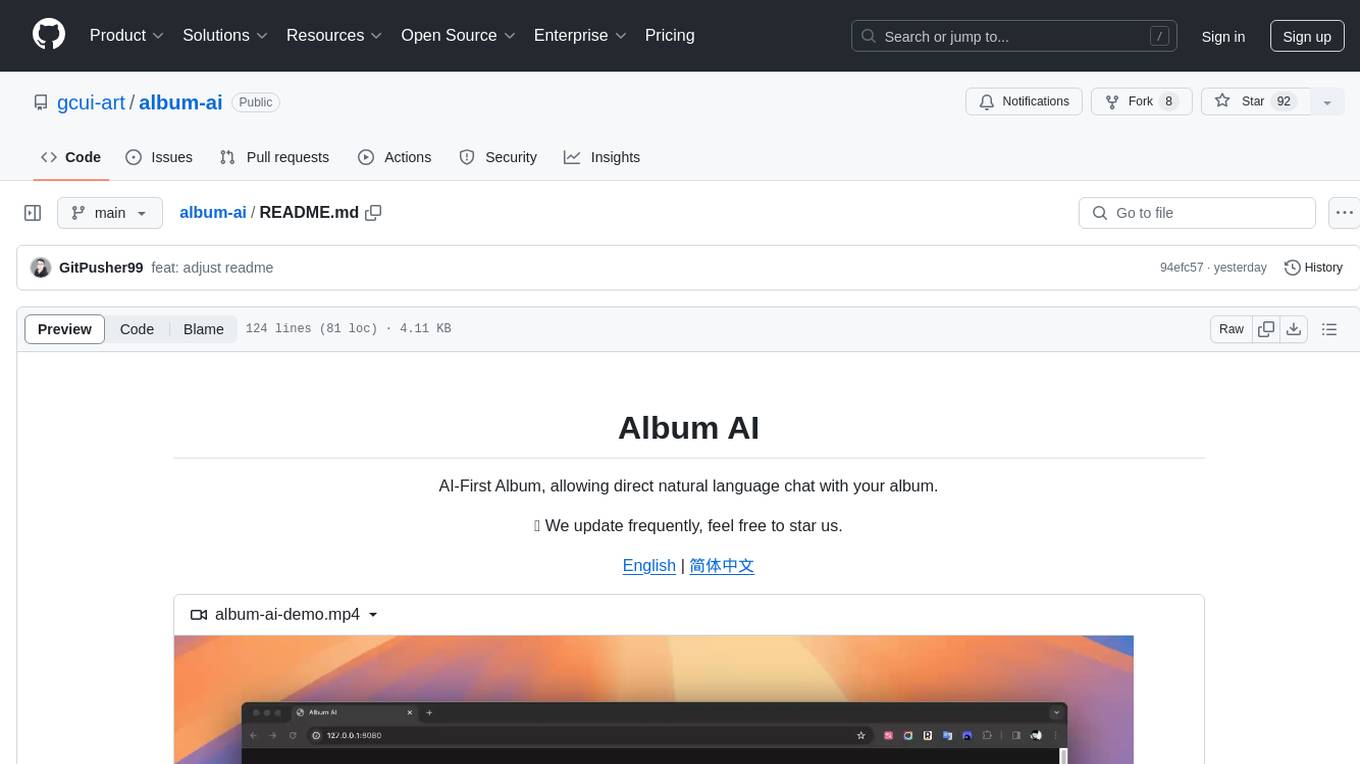
album-ai
Album AI is an experimental project that uses GPT-4o-mini to automatically identify metadata from image files in the album. It leverages RAG technology to enable conversations with the album, serving as a photo album or image knowledge base to assist in content generation. The tool provides APIs for search and chat functionalities, supports one-click deployment to platforms like Render, and allows for integration and modification under a permissive open-source license.
For similar jobs

weave
Weave is a toolkit for developing Generative AI applications, built by Weights & Biases. With Weave, you can log and debug language model inputs, outputs, and traces; build rigorous, apples-to-apples evaluations for language model use cases; and organize all the information generated across the LLM workflow, from experimentation to evaluations to production. Weave aims to bring rigor, best-practices, and composability to the inherently experimental process of developing Generative AI software, without introducing cognitive overhead.

agentcloud
AgentCloud is an open-source platform that enables companies to build and deploy private LLM chat apps, empowering teams to securely interact with their data. It comprises three main components: Agent Backend, Webapp, and Vector Proxy. To run this project locally, clone the repository, install Docker, and start the services. The project is licensed under the GNU Affero General Public License, version 3 only. Contributions and feedback are welcome from the community.

oss-fuzz-gen
This framework generates fuzz targets for real-world `C`/`C++` projects with various Large Language Models (LLM) and benchmarks them via the `OSS-Fuzz` platform. It manages to successfully leverage LLMs to generate valid fuzz targets (which generate non-zero coverage increase) for 160 C/C++ projects. The maximum line coverage increase is 29% from the existing human-written targets.

LLMStack
LLMStack is a no-code platform for building generative AI agents, workflows, and chatbots. It allows users to connect their own data, internal tools, and GPT-powered models without any coding experience. LLMStack can be deployed to the cloud or on-premise and can be accessed via HTTP API or triggered from Slack or Discord.

VisionCraft
The VisionCraft API is a free API for using over 100 different AI models. From images to sound.

kaito
Kaito is an operator that automates the AI/ML inference model deployment in a Kubernetes cluster. It manages large model files using container images, avoids tuning deployment parameters to fit GPU hardware by providing preset configurations, auto-provisions GPU nodes based on model requirements, and hosts large model images in the public Microsoft Container Registry (MCR) if the license allows. Using Kaito, the workflow of onboarding large AI inference models in Kubernetes is largely simplified.

PyRIT
PyRIT is an open access automation framework designed to empower security professionals and ML engineers to red team foundation models and their applications. It automates AI Red Teaming tasks to allow operators to focus on more complicated and time-consuming tasks and can also identify security harms such as misuse (e.g., malware generation, jailbreaking), and privacy harms (e.g., identity theft). The goal is to allow researchers to have a baseline of how well their model and entire inference pipeline is doing against different harm categories and to be able to compare that baseline to future iterations of their model. This allows them to have empirical data on how well their model is doing today, and detect any degradation of performance based on future improvements.

Azure-Analytics-and-AI-Engagement
The Azure-Analytics-and-AI-Engagement repository provides packaged Industry Scenario DREAM Demos with ARM templates (Containing a demo web application, Power BI reports, Synapse resources, AML Notebooks etc.) that can be deployed in a customer’s subscription using the CAPE tool within a matter of few hours. Partners can also deploy DREAM Demos in their own subscriptions using DPoC.









